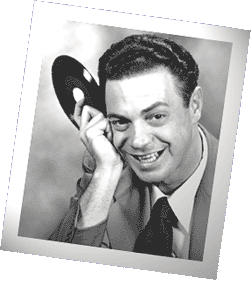“…When disc-jockey Alan Freed put the needle to Todd Rhode’s ‘Blues for a Moondog’ (aka ‘Blues for The Red Boy’) on Cleveland radio’s Station WJW, something special happened…. Freed made raucous rhythm & blues accessible to the teens who dared tune in to this forbidden ‘race’ music… Some say this… was the birth of Rock n’ Roll…”
On this, the 25th Anniversary of Elvis Presley’s passing, fans from all over the world pay tribute to “the King.”. However, during Elvis’ time, there was another with the title “King of Rock n’ Roll.”. Though forgotten today, in the ’50’s, his popularity & controversy rivaled that of Presley. Though not a musician (at least, not during rock’s inception), but as an extremely powerful & influential promoter, he became rock n’ roll’s (& it’s teenage fans’) first champion. Unfortunately, like Presley, his life would end in tragedy. He was Alan Freed, the man who gave Rock n’ Roll it’s name….
With swing having been replaced by both experimental jazz & pop balladeers, the sounds coming from the radio during prime broadcast hours were anything but understandable to the nation’s teens. As a result, by the late ’40’s & early ’50’s, teenagers had started tuning in “after hours”, the broadcast times for “race” music. Detested by white adults, the market for black rhythm & blues among teens had started to grow. White disc jockeys were quick to see the opportunities. There were many such disc jockeys throughout the country. But none was more influential than a former trombone player and classical music disc jockey from Cleveland, named Alan Freed. A man who decided to start his own rhythm & blues formatted show after being approached by record-store owner Leo Mintz, in the hopes that Freed’s broadcasts would further Mintz’s already growing sales of black music. Freed, truly an entertainer on the air, dazzled Cleveland listeners with his jive patter & his collection of wild, pulse-pounding platters (courtesy of Leo Mintz.). He became a surrogate father to his listeners, playing the “forbidden” music they wanted. And with the growing popularity of his “Moondog” radio program (named after a popular record of the time), he amassed a major following…
March 21st, 1952 was the day of Freed’s first rhythm & blues concert at the Cleveland Arena. It was also almost his last, since ticket sales outsold the arena’s capacity. Nearly 25,000 teens caused a riot as they crashed the gates to see the musicians that “The Moondog” had brought for their entertainment. None could deny Freed’s influence. Eventually Freed moved to station WINS in New York amidst much hype. He quickly conquered New York, raising the ire of both conservative whites who detested black music, as well as black disc-jockeys who saw Freed as a white man who was “stealing” their jobs from under them. As in Cleveland, however, Freed’s popularity with listeners was unstoppable. It was in New York, however, that a street-performer who also used the name “Moondog” took Freed to court over it’s use. To avoid litigation, Freed borrowed the term “rock n’ roll”, an African-American euphemism for sex, that had frequently been used in “dirty” rhythm & blues lyrics. At first, “rock n’ roll” had been used to mean Freed’s program of “blues & rhythm” records. Later, however, (possibly as a marketing strategy to mask the music’s black origins) “rock n’ roll” came to mean the music aired on Freed’s show. The music finally had a name….
As Freed’s audiences became more & more integrated, the popularity of the artists represented in his shows grew as well. Little Richard, Chuck Berry, and Frankie Lymon, whose record companies had made “deals” with Freed, owed their popularity, at least in part, to him. (Interestingly, Freed never considered Elvis to be a “rock n’ roller”, explaining that Presley “sings country & western.”). However, with the controversy surrounding rock’s “suggestiveness & influence upon juvenile delinquency”, as well as the issue over racial integration, Freed’s favoring of black performers would prove to be his undoing. Freed openly condemned the practice of “cover” records (recordings of black artists’ songs by whites who got more favorable air-play for the same song.) His statements were later used against him when his television show, “The Big Beat”, was cancelled, due to black do-wop singer Frankie Lymon dancing with a white girl on the air. An earlier Freed concert in Boston, featuring Jerry Lee Lewis, had also fueled controversy, due to the stabbing of a sailor on a street near the show, by teens who had allegedly attended the performance. Then in 1959, Congressional hearings on the practice of “payola” (the practice of record companies paying dee-jays for air-play) began. The Committee zeroed in on Freed. In the end, Freed was blacklisted from New York radio. He died penniless and an alcoholic in 1965, all but forgotten…
Freed’s music changed the shape of our popular culture forever. He gave the music it’s name (unsuccessfully trying to copyright it!). He was also a champion of black musicians during the height of America’s segregation policy. He did take money for air-play, but then, so did every other dee-jay of that time. He was one of Rock n’ Roll’s first tragic heroes, a casualty that would define The Rock n’ Roll Lifestyle…
For more information on Alan Freed & the early days of rock n’ roll radio, check out John A. Jackson’s biographical book, Big Beat Heat, from Schirmer Books. Also recommended is the documentary Rock n’ Roll Invaders.
Michael Quebec – May 2002







